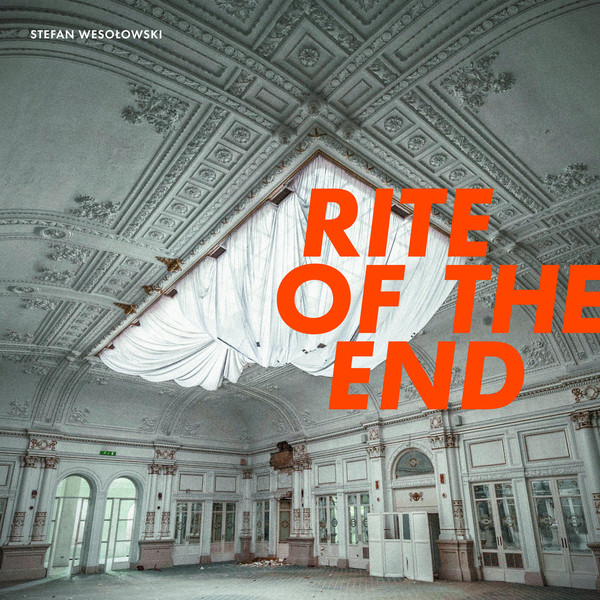
 |
|
 |
Format: LP Label & Cat.Number: Ici D'Ailleurs Mind Travels Series MT07LP Release Year: 2017 Note: second album on Ici D'Ailleurs for this Polish composer, who works in the fields of beautiful but also dark and droning neo-classic chamber music, refined with influences from religious and spiritual elevated sounds... this has mesmerizing, ethereal drone passages full of yearning and emotion.. reminds on MAX RICHTER, JOHANN JOHANNSSON, but also TIM HECKER, TROUM, MOLJEBKA PVLSE..."a music which permits transcendence, contemplation, wonderment"...
Price (incl. 19% VAT): €18.00 Warning: Currently we do not have this album in stock!
More Info"A panoramic "wide screen" music which sounds like the missing link between the grandeur of Richard Wagner and the orchestral work of someone like Nick Cave. This is the ambition underlying Rite Of The End by the Polish composer Stefan Wesołowski, the second album to be released at Ici D'ailleurs following Kompleta in 2015 (MTS 004CD/LP). The album derives from an order from Stéphane Grégoire, boss of Ici D'ailleurs, who asked Wesołowski to write the music for a photo exhibition by Francis Meslet. The Rite Of The End by the composer's own admission ended up nothing like what had been initially ordered. Wesołowski shuffles the cards and mixes influences such as Prokofiev, Gregorian chants, Steve Reich or even Michael Mann. Rite Of The End is in fact actually quite close to Max Richter's classical surprises, a composer with whom Stefan Wesołowski shares a taste for elevation, and takes its religious source in Stefan Wesołowski's own childhood. He was born in 1985, in Poland, in the late Cold War era and is the son of a "spiritual and uncompromising" man who guided to the path of the beauty of the gesture. After having followed the same path as his two elder brothers and studied classical music, very early on he had a revelation thanks to a friend who was a Dominican monk. "We were teenagers," recounts Stefan, "and this friend asked me to write him liturgical songs. That's how it all started." As Wesołowski grew up, he lost his religious faith and transposed it into a growing belief, into what is called "beautiful music". A music which permits transcendence, contemplation, wonderment, because it is, in itself, the only means for man to extricate himself from his animal condition. Wesołowski also admits to a part of his musical education coming from the Beatles and the Stranglers, so it's understandable that the rituals here are those that push us every day to prostrate ourselves in front of two loud-speakers, regardless of the name of the gods. The six slow ceremonies of Rite Of The End are attractive through their praise of slowness and appreciation of the beautiful. This music is certainly classical in its foundations but is not when you listen to it. Americans would use the word unconventional. A term that fits Wesołowski perfectly, as he is punk to the very tip of his violin bow.""Rite of the End is the seventh edition of Ici d’ailleurs’ ongoing Mind Travels series and the second for Stefan Wesolowski following the reissue of Kompleta. He’s come a long way since that debut set and even more since Liebestod. The latest collection holds together beautifully from majestic brass prelude to cathartic electronic finale, and its internal consistency makes it his most fully-realized vision to date. To understand Wesolowski, one must first understand his spiritual heritage. As a child, the composer was so connected to his religion that he planned to become a priest. As an adult, he transferred his faith to music, in particular “a music which permits transcendence, contemplation, wonderment”. It’s important here to distinguish the difference between faith and religion, as the two are unsteady partners, the second always living in the shadow of the first, never measuring up, nor able to do so by design. For Wesolowski, music provides the purity he sought in buildings and rites; the rite of the end may as well mean the end of the rite. In another sense, this album implies a different manner of end: not an apocalypse, but the holy dismantling of an ineffective mindset. One look at the cover, and one can already intuit that this is spiritual music, concerned not with ceilings but with the light that filters through skyscapes. Wesolowski continues to seek the divine, albeit through a more direct connection. We hear this in the deliberate pacing, the yearning of the violins, the harmonic highs ~ but also in the droning lows, the earthly electronics, the tactile immediacy of the interface between heaven and earth. Ironically, the music was commissioned to accompany a photo shoot. There’s no indication that this shoot actually took place, but if so, we suspect that it was one of the most emotional shoots of all time. Better perhaps to indicate that Wesolowski cannot escape his influences, no matter the scenario. When strings are added to the stately processions of “Frame II”, one imagines a courtly wedding, a cavalcade of priests, a chalice lifted, a cross caressed. The composer has not left such things behind; he’s simply translated their physical forms into musical forms. Rite of the End contains many such touches, reminders of a life ruled by tradition. Yet the outskirts of the album contain its most modern impulses. As it all falls apart, barreling down a tunnel of crunching distortion, one thinks not of what has been lost but of the necessity of new forms. As the static gives way to the dynamic, one remarks, but of course. A god that can be tamed is no god at all." (Richard Allen/A Closer Listen) |
| © 2007 Drone Records | | Celler Strasse 33, 28205 Bremen, Germany | Privacy and cookies policy | Impressum / Allgemeine Geschaftsbedingungen / Haftungsausschluss | Links to the scene |